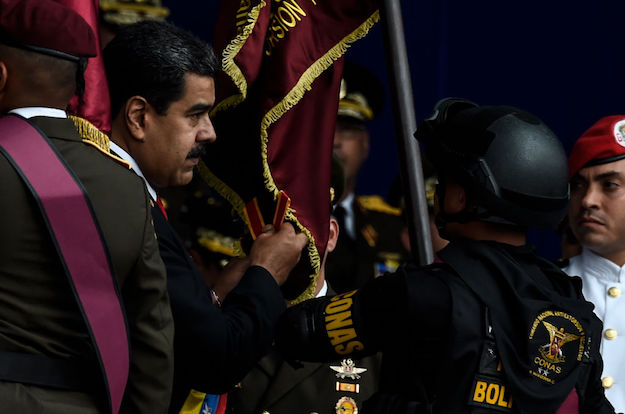If there is anything we have learned from the supposed assassination attempt against Nicolás Maduro with drones, it is that persecution is going to increase in Venezuela.
It is state policy to systematically violate the human rights of the citizenry, especially if there is an excuse like the alleged attack on Aug. 4. Neither the Venezuelan people nor most of the international community believe that Maduro would have been the victim of an attempted attack. History indicates that these accusations could be part of a perverse strategy inspired by Havana to incarcerate those who think differently.
Even though Venezuela is a country where it is impossible to attain justice due to rampant impunity, just one hour after the supposed attack, Minister of Communication and Information Jorge Rodríguez already had “proof” that, according to him, revealed the masterminds and materials behind the alleged attack against the dictator: the opposition.
Just 72 hours later, Juan Requesens, an important emerging leader and deputy in the National Assembly, was kidnapped with his sister by the intelligence service SEBIN and accused of a failed homicide attempt. As I am writing this, his whereabouts remain unknown. This new detention adds to the list of over 300 political prisoners in Venezuela, which will aggravate the discontent of a population that does not live, but rather survives with a constant lack of food and medicine, the collapse of basic services, insecurity and hyperinflation.
Maduro does not enjoy popularity, but at this point, after 20 years of “revolution,” he does not care because his power is maintained by weapons. The regime has advanced significantly from authoritarianism into totalitarianism, which has led many to consider Venezuela a failed state. The regime is a threat to the region and has caused the Western Hemisphere’s most serious crisis.
Nobody on the continent benefits from a dictatorship of this nature. The regime has forced some 3 million Venezuelans into exile, causing serious problems for the receiving nations. This is not because a Venezuelans who emigrate are bad person – they are not. Rather, it is a result of the conditions in which they arrive in other countries. This huge flow of emigrants includes hundreds of thousands of people living in poverty who have escaped with nothing, just to end up sleeping on the streets or, if they are lucky, in shelters.
Many of those who escape suffer from illnesses that have long since disappeared in the receiving countries, like malaria and diphtheria, and they run the risk of creating a massive contagion. There are now cases in Brazil of people newly contracting illnesses, such as measles, that were previously eradicated. In addition, the costs of investment in infrastructure, education, nutrition and health are very high, and can alter the budget of some receiving countries. There are also political refugees, like myself; I was forced to emigrate to the United States in August of 2017, after Maduro’s regime removed me from my position as mayor of El Hatillo, Caracas, and ordered my arrest.
But the biggest threat to the region comes from the promotion and protection of illicit activities – including the traffic of drugs, minerals, gasoline and even people – on the part of the Venezuelan government. Maduro’s regime not only conducts the world’s largest legal trade, which is gasoline, but also finances the world’s largest illegal trade: cocaine. Every day planes fly through Venezuelan airspace carrying Colombian cocaine to destinations in Central America and the Caribbean. The nephews of Venezuela’s first family are prisoners in the United States after having been detained in Haiti with drug cargo. The ex-vice president and current minister of industry, Tareck El Aissami, and the current president of the National Constituent Assembly, Diosdado Cabello, have been sanctioned by the United States and the European Union for basically being real-life protagonists of the series “Narcos.”
Lastly, but no less relevant, is the geopolitical factor: The Venezuelan dictatorship is destabilizing Latin America. Maduro is a puppet of Cuba’s Raúl Castro and has in Venezuela offered a sphere of influence for Vladimir Putin’s Russia. Moscow has found an ideal ally in Caracas to trouble Washington. In addition, Maduro has expanded relations with the authoritarian government in Turkey and cooperates with paramilitary groups in Nicaragua to keep Daniel Ortega in power. Colombia will not be able to achieve peace while guerrillas and drugs maintain refuge nearby. China, meanwhile, is only concerned with paying debt without condemning the everyday atrocities that the dictatorship commits. Syria, Iran and North Korea appear in the news daily, but no regime is better geographically situated to continue threatening and destabilizing Latin America as the Venezuelan dictatorship.
Facing this threat, the international community, especially Latin America, should extend sanctions to operatives of the regime involved in illegal trafficking, corruption, money laundering and human rights violations. Furthermore, they should restrict the free movement of these “revolution defenders” who have impoverished Venezuela and contaminated its financial system to hide all traces of embezzlement. It is also important to standardize a system for granting asylum to Venezuelan refugees, promote campaigns against xenophobia towards emigrants and create a foundation of multilateral cooperation that guarantees protection and attention to the displaced with education, shelter, sustenance, healthcare and training.
—
Smolansky is the exiled former mayor of El Hatillo, Venezuela








